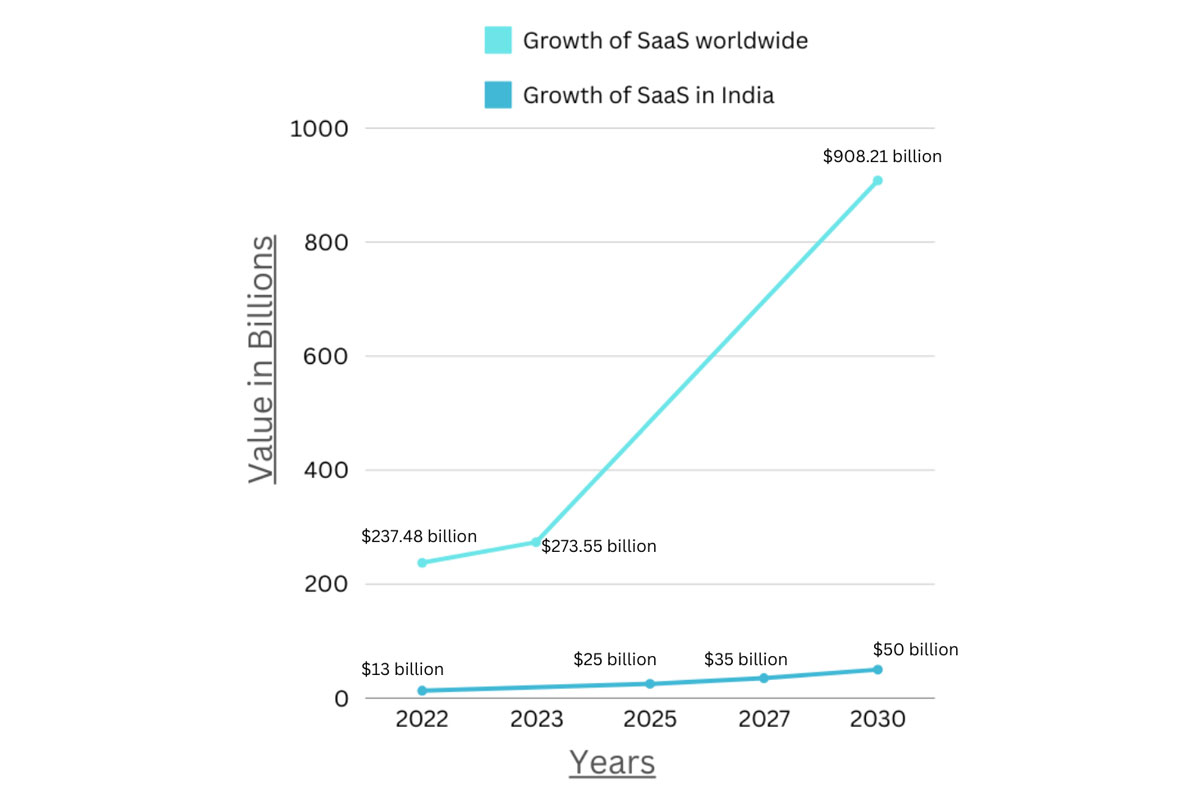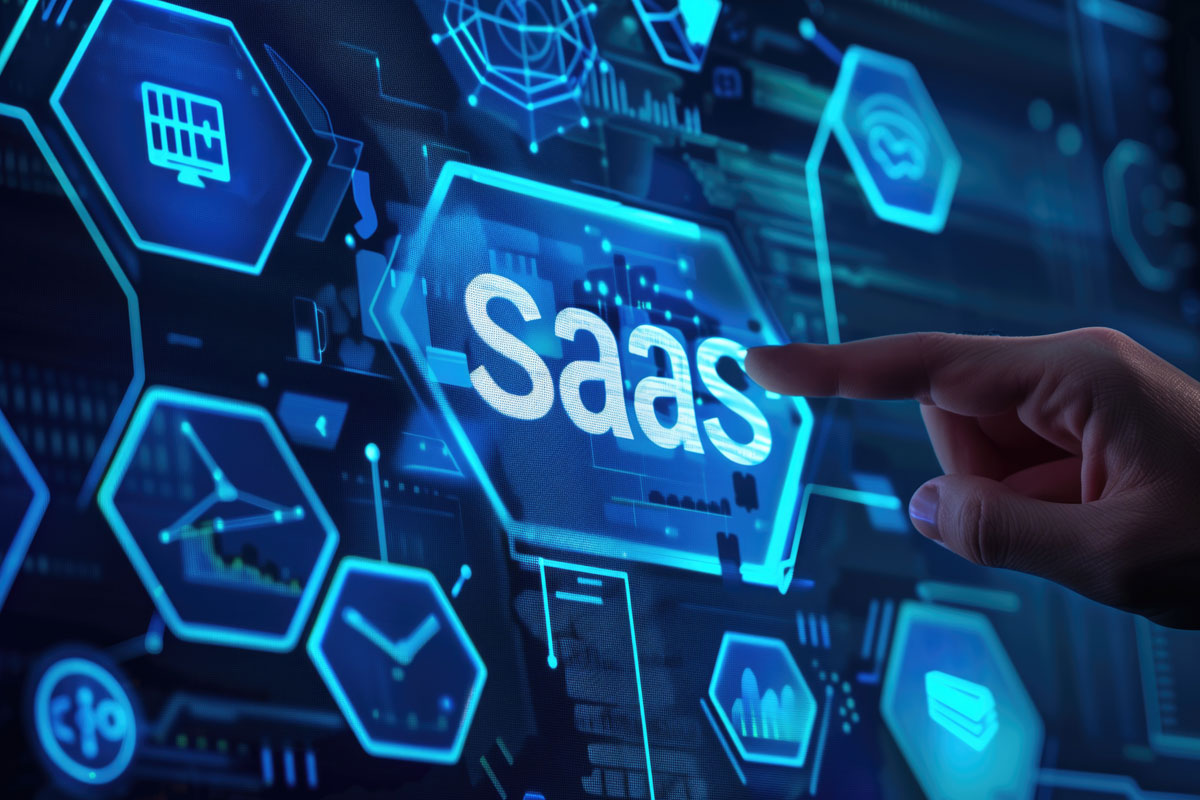Pie chart of SaaS market of India vs Worldwide
Growth of SaaS Market in India

SaaS - Software as a Service, lets you use cloud-based apps through the internet, usually in a web browser. Instead of buying and installing software, you rent it from a provider who manages everything for you—hardware, software, and data security. This way, you can start using the app quickly and without a big upfront cost.
As the above statistic shows the global SaaS market is projected to expand from $237.48 billion in 2022 to $908.21 billion by 2030. Meanwhile, India's SaaS industry, emerging as a key digital transformation driver, is set to grow from $13 billion in 2022 to $50 billion by 2030.
As of present, 71% of businesses worldwide rely on SaaS model apps, confirming their position as main accelerators for digital transformation. The fact that over half of the world's data is expected to be kept on the cloud by 2025 highlights the necessity for SaaS solutions. This shift to cloud-based solutions is changing the way organizations operate and handle data, welcoming in a new era of efficiency and accessibility.
The Reasons of Rise of SaaS in India
- Cost Efficiency: Lower upfront costs with subscription models.
- Scalability: Easy to adjust based on business needs.
- Accessibility: Cloud-based, accessible from anywhere.
- Integration: Connect easily with other tools.
- User-Friendly: Easy to use interfaces that require minimal training.
- Security: Strong security measures from users.
- Analytics: Built-in tools for data insights.

Advantages of SaaS
Gain access to sophisticated applications. To provide SaaS apps to users, you don’t need to purchase, install, update, or maintain any hardware, middleware, or software. SaaS makes even sophisticated enterprise applications, such as ERP and CRM, affordable for organizations that lack the resources to buy, deploy, and manage the required infrastructure and software themselves.
Pay only for what you use. You also save money because the SaaS service automatically scales up and down according to the level of usage.
Use free client software. Users can run most SaaS apps directly from their web browser without needing to download and install any software, although some apps require plugins. This means that you don’t need to purchase and install special software for your users.
Access app data from anywhere. With data stored in the cloud, users can access their information from any Internet-connected computer or mobile device. And when app data is stored in the cloud, no data is lost if a user’s computer or device fails.
How Ai can help in creating business model?
Indian software suppliers are increasingly integrating artificial intelligence (AI) into their products to enhance customer experience and operational efficiency. Currently, India accounts for 15-20% of the global AI industry and is projected to grow significantly in the coming years. This workforce primarily focuses on applying AI in the services layer, leveraging India’s strengths as a global back office.
With its vast talent pool and cost advantages, India is well-positioned to support the AI needs of global companies. In contrast, U.S. AI talent is more concentrated on research, product development, and innovation, driving advancements in technology. As Indian firms adopt AI, they are not only improving their service offerings but also contributing to the overall growth of the global AI ecosystem, making India a key player in the future of AI development.
The Current Landscape of SaaS market in Event industry
India's SaaS business is predicted to develop rapidly, with revenues reaching $10 billion by 2025, up from over $3.5 billion in 2020. This rise of SaaS is driven by a number of reasons, including star tup, rising internet usage, and numerous IT expertise. Several Indian SaaS firms, such as Zoho, Fresh works, and Events Genie, have already established themselves.
Key Trends Driving SaaS growth in event industry
- Virtual and Hybrid Events: As events go online or mix in-person with virtual, there's a growing need for SaaS platforms to handle things like online registration, live streaming, and virtual networking. For instance, Vex Events, Sarcon etc.
- Data-Driven Decisions: SaaS tools help event organizers make smarter choices by providing real-time data on their attendee’s behaviour.
- Personalization and Engagement: SaaS platforms offer features like personalized schedules and AI-powered matchmaking, making events more engaging and made it more personalise as per the individual’s preferences.
- Mobile Access: With number of people use their phones for almost all of their daily work, SaaS platforms ensure attendees can easily access event content and network right from their mobile devices.
- Scalability: Whether it's a small meeting or a huge conference, SaaS platforms can easily scale to meet the needs of any event size.
- Cost-Effectiveness: SaaS is budget-friendly since you pay as you go, avoiding large upfront costs, which is great for keeping event budgets in check.
In conclusion it can be said that event industry’s requirement for virtual and hybrid events, along with focus on data insights, personalised experience for participants, are the major reason for the adoption of SaaS into events. SaaS gives the flexibility and efficiency required to meet the changing demands in today’s industry. With the usage of mobile applications and integrated platforms improving accessibility, it is quite visible that SaaS has the potential to take over the event business by allowing event organisers to create engaging and unique experiences for their audiences.


